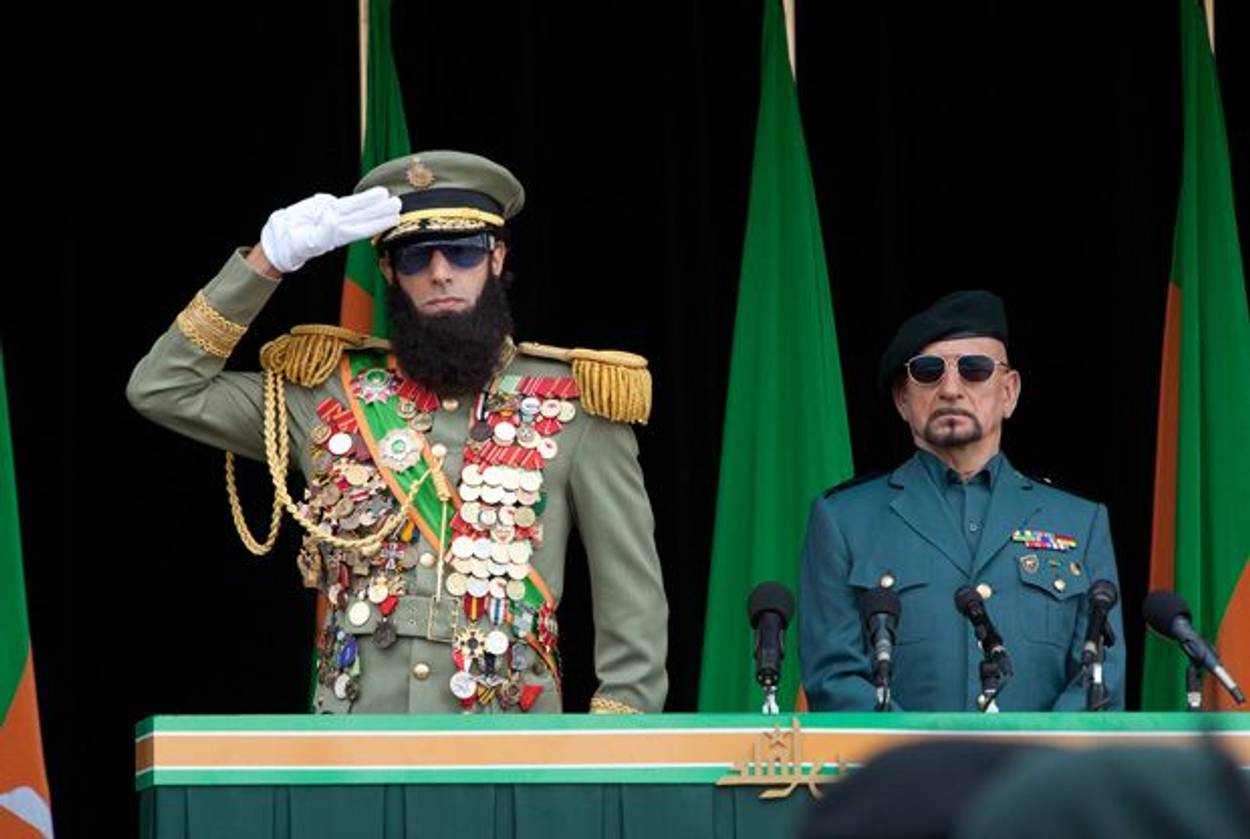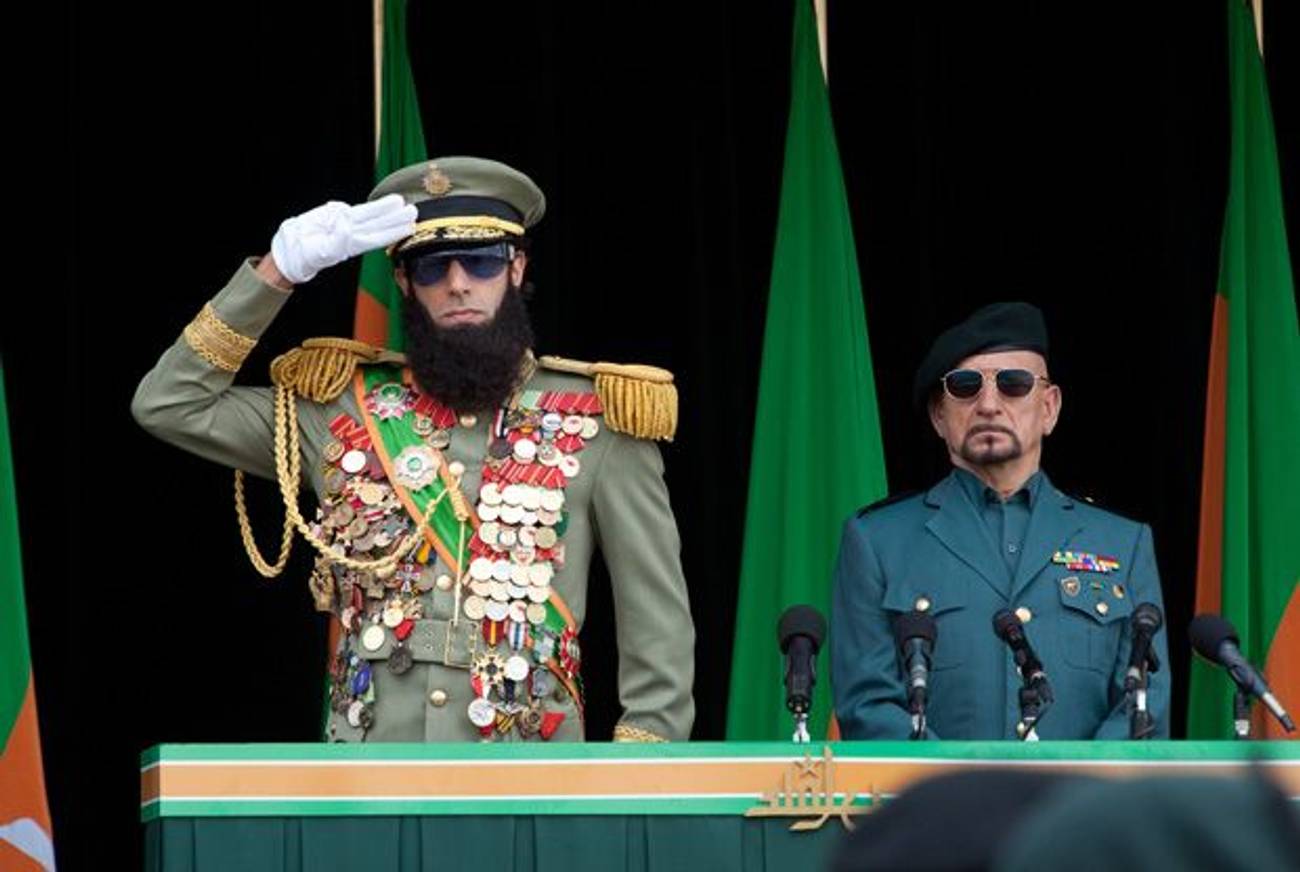The Not-So-Great ‘Dictator’
In his Arab-despot farce, Sacha Baron Cohen tries too hard to get under the skin of Arabs, Jews, and Americans




Tasteless but by no means mindless, Sacha Baron Cohen is the most incendiary Jewish performance artist since Lenny Bruce. (You were thinking Jackie Mason?) Although his personal ideology would seem to be some form of left Zionism, his vaudeville travesties and gross-out pranks outrage nationalists of all persuasions and moralizers across the political spectrum.
The Nation’s film critic Stuart Klawans began his insightful review of Boratby comparing SBC (as the Brits refer to Baron Cohen perhaps to avoid the accidental conferring of a noble title) to “another English comedian sporting curly hair and a funny mustache,” namely Charles Chaplin. Vulgar and déclassé, popular culture personified, Chaplin was often mistaken for a Jew—not least by the Nazis, who used him as the poster child for the notorious “Ewige Jude” exhibit of 1938. The Dictator, which opens tomorrow, is in some ways, Baron Cohen’s version of Chaplin’s The Great [sic] Dictator, a remarkable would-be political intervention in which the world’s single most famous individual broke both Hollywood and political taboos to directly ridicule Hitler.
Yet SBC is a tough act to follow, even for SBC himself. Da Ali G Show was brilliant. Borat: Cultural Learnings of America for Make Benefit Glorious Nation of Kazakhstan was pure genius, and Brüno extremely provocative. The Dictator, however, is merely—although at times very—funny. The spectacle of Admiral General Aladeen, the inanely grinning, alarmingly bearded “Mad Dog of Wadiya,” riding a blond camel down Fifth Avenue flanked by a Praetorian guard of militant houris is an image for the ages. Wadiya (as in “wadiya doin’?”), indeed.
The problem is that, unlike Ali G, Borat, and Brüno, Aladeen is less a force of nature than a scripted performance. Despite Baron Cohen’s insistence on giving interviews in character, The Dictator—directed, like Borat and Brüno, by Larry Charles—is entirely fictional. Da Baron has given up da shtick. Thus, save for a few quick shots in midtown Manhattan, he never mixes it up with unaware civilians and clueless celebs. The closest thing to a stooge in The Dictator is Anna Faris, required to play politically correct straight woman (a Williamsburg-living feminist health food advocate) to the antics of SBC’s wild and crazy North African tyrant.
An expert clown in her own right, Faris was expected to improvise in response to Baron Cohen’s behavior. The star never broke character during the shoot, she told the New York Times, although “I think he enjoyed playing the role.” Faris noted that SBC used his Aladeen persona to, in effect, direct her performance. Much of Baron Cohen’s “improv” involved bizarre insults (“hairy-pitted yeti,” “lesbian hobbit”) or threats of violence: “If I reacted in a way that displayed discomfort, it was like a bulldog with a bone, not letting go.” The strategy was to get under her skin—and to get under ours.
Dedicated to the late Kim Jung Il, haunted by the ghosts of Muammar Qaddafi and Saddam Hussein (whose alleged romance novel Zabibah and the King was at one point reported as the movie’s source), The Dictator seems, at least on the surface, a satire of oil-rich Arab tyrants. Admiral General Aladeen is an old school secular tyrant (what Marx called an “oriental despot”) and a Borat-style boor. He stages his own rigged Olympics (shooting rivals with the starter’s gun), wreaks havoc in Wadiya’s health clinics by changing the language such that his name becomes the word for both “positive” and “negative,” announces a nuclear weapons program, and cracks himself up when he insists that his enriched uranium is intended for peaceful “clean energy.” This last stunt attracts the attention of the United States, requiring Aladeen and his treacherous uncle Tamir (Ben Kingsley) to address the United Nations.
SBC gets maximum mileage out of a juicy Arab accent. But mainly he puts the “infantile” in the fantasy of infantile omnipotence. (Aladeen has a harem of paid super-celebrities—we see Megan Fox, who plays herself, leaving his bed, and refusing his offer to “cuddle,” because she has an early morning appointment with the Italian prime minister.) Just about every bodily function gets some airtime. Offensive ethnic stereotypes rule and questionable Jewish material is never far from the surface—first erupting when Aladeen amuses himself by playing a Munich Olympics videogame with sound effects that include shouts of “meshuganah” and “oy vey.” It’s a shocking joke that jolts one into realizing that the powerful opening sequence of Steven Spielberg’s Munich was also a form of entertainment and perhaps even inadvertent terrorist porn.
Although designed to offend Arab and Jew alike, The Dictator lacks the conceptual rigor of Borat or Brüno (which in its purposefully idiotic way attempted to negotiate the divide between Israelis and Palestinians). Borat, which allowed Baron Cohen to simultaneously play a crypto-Jewish outsider and a blithely offensive anti-Semite, managed to simultaneously exploit American friendliness and expose American nativism. Brüno burlesqued homophobia the way Borat did xenophobia.
Unlike Chaplin’s film, The Dictator is not really addressing a political crisis: The film has little relevance to either the Arab Spring or the conflict between Israel and Iran. Nor does Baron Cohen have any particular interest in employing the innocent double as a mouthpiece. Chaplin used the barber to deliver a sentimental anti-fascist speech at the end of The Great Dictator; in the The Dictator, it’s Aladeen who breaks (or at least cracks) the proscenium to make a blunt political statement—not about the Middle East but the inequities of American society.
SBC’s humor thrives on inadvertent disclosure and his essential subject is the Land of the Free. No less than the grotesque greenhorn Borat and over-civilized European Brüno, Aladeen is a stranger in our strange land. (“Twenty dollars a day for Wi-Fi,” he exclaims on checking into a posh midtown hotel. “And they call me an international criminal!”) Confined by a conventional narrative, The Dictator at times resembles the John Landis-Eddie Murphy fish-out-of-water comedies of the mid ‘80s, Trading Places and Coming to America—although SBC’s Aladeen is at once more hapless and offensive than Murphy. In the riotous aftermath of an anti-Aladeen demonstration, he’s rescued by fellow demonstrator Zoey (Faris) and taken to work in her Williamsburg organic food co-op. Patronized by self-important bobos and staffed by Third World political ’fugees, the place is basically a barrel full of fish for Baron Cohen to shoot at will. Alternately crude and clueless, Aladeen even enters into a sort of relationship with Zoey. Weary of his importuning, she encourages him to masturbate; the ensuing orgasmic epiphany (compete with interpolated shot from Forrest Gump) improves his personality … but only slightly.
The gross-out set pieces are memorable (Aladeen “helping” to “deliver” a baby on the food co-op floor, losing his cellphone in the birth canal and bellowing, “It’s a girl—where’s the trash can?”) But The Dictator basically exists as a frame for two notable dialogue-driven scenes. The first is Aladeen’s defense of dictatorship and explication of its benefits, in terms mirroring an Occupy Wall Street analysis of American society. The second, far trickier to parse, has Aladeen and his nuclear expert Nadal (Jason Mantzoukas) taking a tourist helicopter ride over Manhattan.
High above the city, the two Wadiyans engage in an extended conversation in their native language—translated in subtitles—that, replete with references to the Porsche model 911 and various New York landmarks, sends their fellow passengers into freak-out hysteria of immanent terror attack. Thus, only a few weeks after The Avengers orchestrated a comic-book version of 9/11 as its great finale to awesome success (and, as noted elsewhere, remarkably little comment), Baron Cohen evokes the catastrophe with a complex linguistic gag. The secret language Aladeen and Nadal are speaking is in large part Hebrew; the scene manages to parody both Arabophobia as well as the conspiratorial assertion that the attack on the World Trade Center was plotted by Jews. (Later, in case we missed the point, the two Wadiyans engage in a Yiddish slanging riff.)
Like all true stars Baron Cohen resolves contradictions: Brüno was at once a narcissistic celebrity and a frantic wannabe; Borat was both a crypto Jew and a rabid Jew-baiter. SBC himself could be described as an amoral moralist, a shy exhibitionist, and an equal opportunity bigot—although it’s worth noting that, like Borat, The Dictator is free of Muslim baiting. As a performer, Baron Cohen is more calculatedly offensive than Howard Stern and yet so stupidly “innocent” he manages to be lovable in a way that Stern could never be. In a final gag, Zoey turns out to be “Jewish” too. The joke’s on Aladeen—and on us.
J. Hoberman was the longtime Village Voice film critic. He is the author, co-author, or editor of 12 books, including Bridge of Light: Yiddish Film Between Two Worlds and, with Jeffrey Shandler, Entertaining America: Jews, Movies, and Broadcasting.